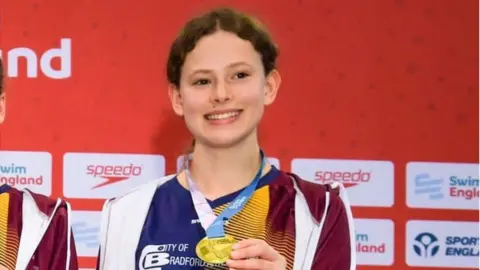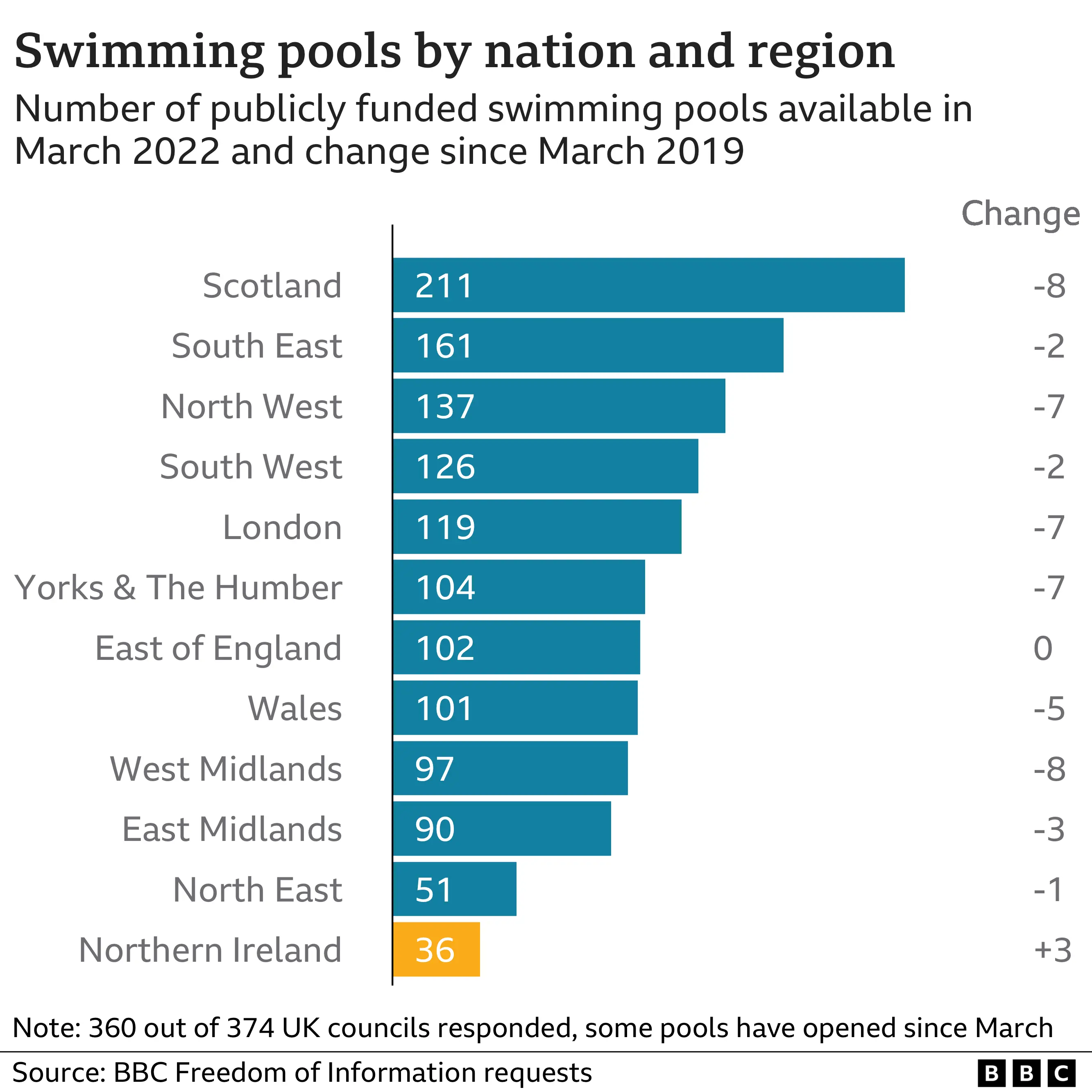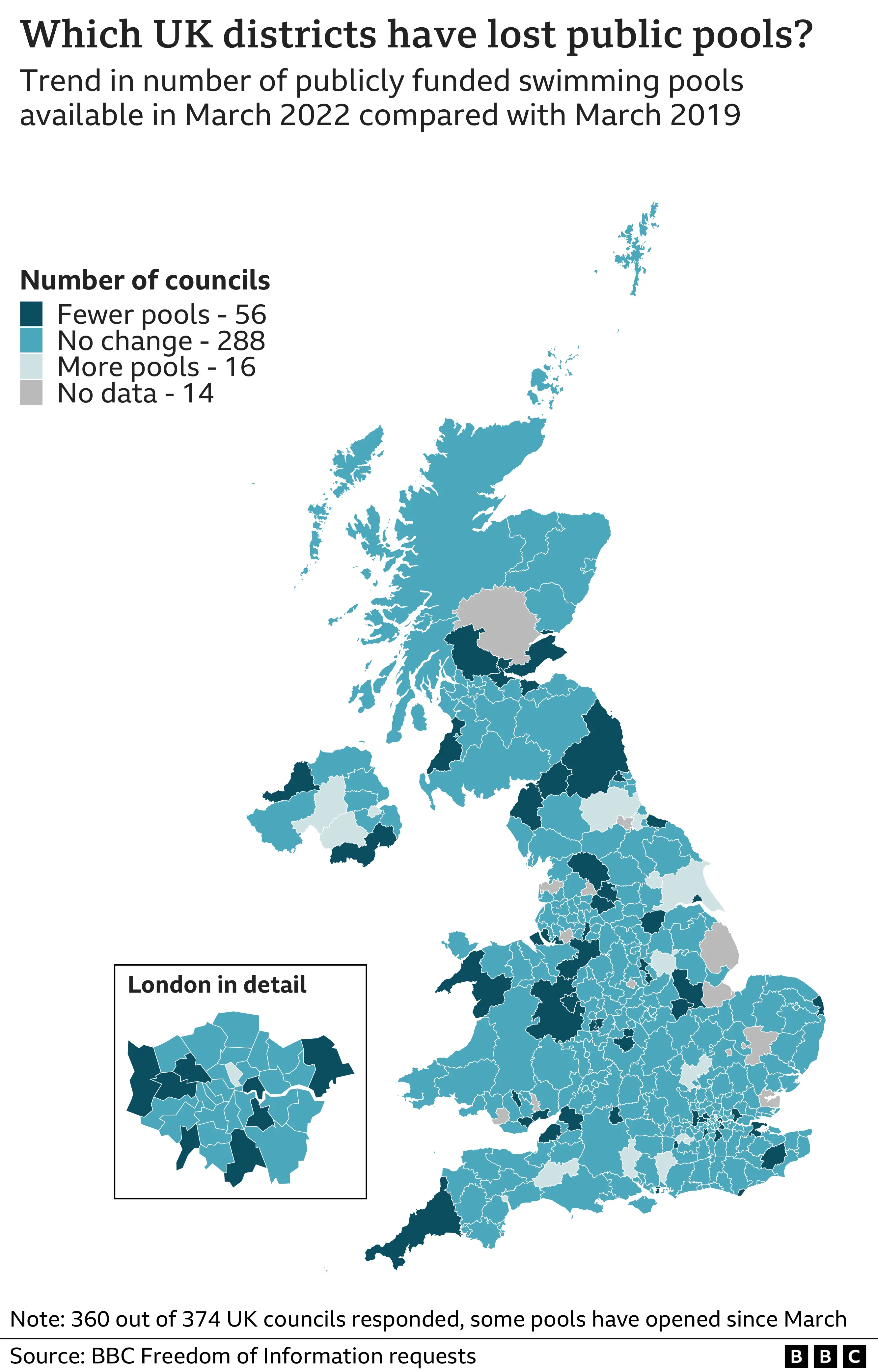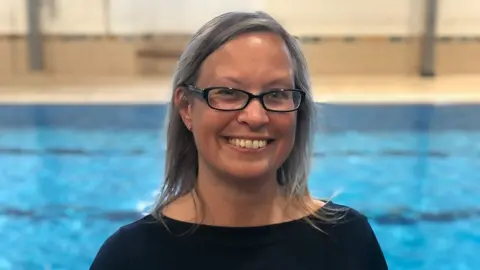Swimming pools: Concern as closures across the UK revealed
Swimmers across the UK have lost access to more than 60 public pools in the last three years, BBC News has found.
Freedom of Information requests to UK councils revealed 65 pools had closed, either temporarily or permanently, in the three years to March 2022.
Ukactive said a lack of staff, rising energy costs and chemical shortages had created a "perfect storm" for centres.
Greg Whyte, a board member at the organisation, said the closures were an "absolute health and welfare disaster".
Ukactive, which represents gyms and leisure centres, said centres had only just started to recover following closures during the Covid-19 pandemic. It warned there was a risk of more permanent closures before the end of the year.
The BBC found about one in six local authorities had lost at least one pool on a permanent or temporary basis, as of March 2022.
Some of them had been closed for good, while others are closed for refurbishment with no fixed reopening date. Others are now only accessible for private hire or swimming clubs.
Pools in Essex, Bedfordshire and Staffordshire have all blamed chlorine shortages for their recent closures.
The West Midlands and Scotland saw the most closures, with eight each. But the West Midlands was hardest hit compared with the overall number of pools available in 2019.
In the West Midlands, the region saw the number of pools fall from 105 to 97, while in Scotland it decreased from 219 to 211.
At the time of the responses - from 360 local authorities out of 374 across the UK - some 1,335 publicly-funded pools were open.
Olympic and Commonwealth champion Adam Peaty has been vocal in asking for more government support to keep pools open - especially for children.
He told the BBC: "The government really needs to work harder to get [to] these kids and give them accessibility".
'We've lost a lot of members'
Edie Caris, 15, has been an artistic swimmer for several years and spends between six and eight hours training.
Previously, her family lived around a 15-minute drive away from her training pool in Halifax. However, this has shut and Edie now trains in Bradford, with some teammates travelling almost an hour to training.
While there are other pools on the outskirts of Halifax, her club says there isn't enough available swimming time for them to use the facilities.
"It's sometimes not viable for parents to drive that far, so we've lost a lot of members," said Edie.
"We used to have about 115 members and we've lost about 60 members, so that's become quite a challenge getting a team together to compete."
 Edie Caris
Edie CarisThe closed pool in Halifax is due to be replaced, but Edie is concerned that it won't provide the same level of facilities.
"It's not going to be suitable for us to train, it's not going to be suitable for the diving club, so they're getting rid of a lot of clubs which were quite unique to Halifax.
"It just makes me feel a bit upset."
Health risks
Ukactive said two million children left primary school unable to swim in the past year.
"The legacy of that goes on and on," added Mr Whyte, a former British Olympian. "Those non-swimming children become non-swimming adults, they then have their own children and non-swimming parents have non-swimming children."
The body's chief executive, Huw Edwards, said there were other health risks related to closing pools.
"Two million children learn to swim in our pools every year and leisure centres provide 66% of our cancer prehab and rehab services, which clearly shows that lives are at stake if they close," he said.
"Our members have laid out the evidence to the government, which now has a duty to support the survival of our gyms, pools and leisure centres through a package of financial and legislative measures that ensures their survival and growth."

"Public leisure facilities are disproportionately relied on by those on lower incomes," said Gerald Vernon-Jackson, chair of the Local Government Association's Culture, Tourism and Sport Board.
"Councils are working incredibly hard to prevent centres from closing, and understand that many people are facing rising individual costs, so have no desire to increase prices if it can be avoided."
However, he added that rising energy costs would potentially impact on future decisions about whether new facilities open.
A spokesperson for the Department of Culture, Sport and Media said: "The government has provided an unprecedented £1bn of public money to ensure the survival of the grassroots, professional sport and leisure sectors.
"This includes the £100m National Leisure Centre Recovery Fund which secured the survival and reopening of more than 1,100 swimming pools all over the country.
"On top of this Sport England, the government's funding agency, has provided over £8.5m to swimming and diving projects, and over £16m to Swim England since 2017."

But among the losses are stories of people working together to save their local pool.
Emma Tudge has led a campaign to keep the pool open in her community in Wadebridge in Cornwall.
"It really has caught the imagination of people locally to keep this place open," she said.
"It's essential for local schoolchildren to learn to swim, and also for our lifeguards locally who are working the beaches all summer long to have a place where they can train.
"I'm really excited that it's genuinely going to be a centre that helps the whole community."

Additional reporting and graphics by: Rob England and Liana Bravo.
